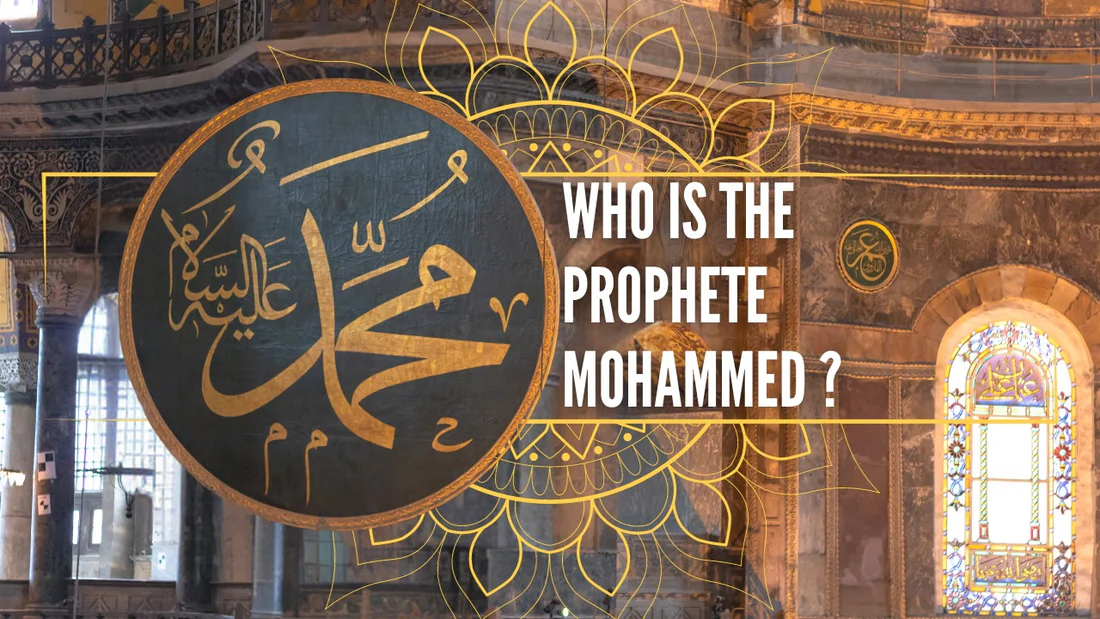Mohamed, Muhammad or Mohammed is the last of the prophets and the messenger of God to humanity with the last of the monotheistic religions, Islam. Its greatest miracle is the Koran, the holy book of the Muslim religion. And it is from the deeds and words of the Prophet (SWS) that Muslims hold the Sunnah Nabawiya.
Birth and childhood of the Prophet Mohammed
Mohamed was born on 12 Rabi’ al-awwal of the year of the elephant (‘Am Al Fil), which corresponds to approximately the year 571 of the Gregorian calendar, in Mecca. (It is this date which is commemorated during Mawlid Annabaoui).
His father Abdullah Bnu ‘Abd al-Muttalib was part of Banou Hachim one of the tribes of Quraysh, he married Amina Bint Wahab and died young even before she gave birth to the prophet.
At his birth, Mohammed was entrusted to Halima Saadia who served as his wet nurse as was the custom in Arabia to entrust newborns to wet nurses from neighboring villages.
His mother died when he was barely 6 years old, he was then entrusted to his grandfather ‘Abd al-Muttalib and upon the latter’s death to his uncle Abu Talib.
Youth of the Prophet Mohammed
Mohamed’s uncle (SWS) was poor, so he had to work from his youth to help him provide for the family’s needs. He was first a shepherd before working in commerce. From his youth, Mohamed (SWS) was known among the tribe of Quraych for his great sincerity, they nicknamed him “Al Amine” (the one who can be trusted).
Khadija, a rich lady from Quraych, entrusted him with her trade caravans so that he could manage her affairs. She was impressed by his honesty and integrity, and it was she who proposed to marry him. Mohammed was then 25 years old, while she was 40. Their marriage lasted 25 years until Khadija’s death, the prophet hardly married another woman until the latter’s death. Khadija was not only the first woman but also the first person to convert to Islam.
Da’wa period
The prophet Mohamed had the habit of going to meditate in a cave called Ghar Hiraa not far from Mecca. It was there that one day when he was 40 years old, the angel Jibril (Gabriel) visited him with the message from God. The first verses of the Quran which were revealed to the prophet were those of Surah Al-Alaq: “Read in the name of your Lord who created everything, who created man from an adhesion! Read, for the goodness of your Lord is infinite! It is He who made the pen a means of knowledge and who taught man what he did not know.”
The revelation of the Quran (word of Allah) to the prophet through Jibril lasted 23 years.
Mohamed (SWS) began to preach the word of God and call on the people of Mecca to convert to Islam in secret at first so as not to provoke the ire of Quraysh who were powerful.
But 3 years after the first revelation, God ordered him to make his preaching public, which triggered the anger of the leaders of Quraych who venerated statues and hardly accepted the precepts of the monotheistic religion preached by the prophet.
The number of converts to Islam increased in Mecca and its surroundings at the same time as Quraysh’s persecution of Muslims, which pushed the prophet to leave Mecca with his followers in the direction of Medina, which was then called Yathrib , after 14 years of calling to Islam.
This exodus called Hijra Nabawiya took place in the year 622 of the Gregorian calendar, and it is this year which will subsequently become the first of the Muslim calendar.
The Prophet (SWS) and his companions were welcomed with open arms by the Muslims of Yathrib who were called Al Ansar, their city was named Medina Madinat Arrasoul (the city of the prophet).
And it was from this city that the foundations of the Muslim state were established and the battles were undertaken which would subsequently lead to the defeat of Quraych and the spread of the Muslim religion to Mecca and to most of the Arab tribes. neighboring areas.
The period of Da’wa lasted 23 years during which the Quran was revealed to the prophet until his last pilgrimage called Hajjat Al Wada’ (Pilgrimage of Farewell) where the last verses were revealed.
Death of the Prophet Mohammed
Shortly after this so-called Farewell pilgrimage, the prophet (SWS) fell ill, he died a few days later on the knees of his wife Aïcha on June 8, 632 which corresponds to Rabi’ al-awwal of the year 11 of the ‘Hegira.
He left a fabulous legacy to Muslims in the Muslim religion and its precepts.
His succession was ensured by his faithful companion Abou Bakr.

